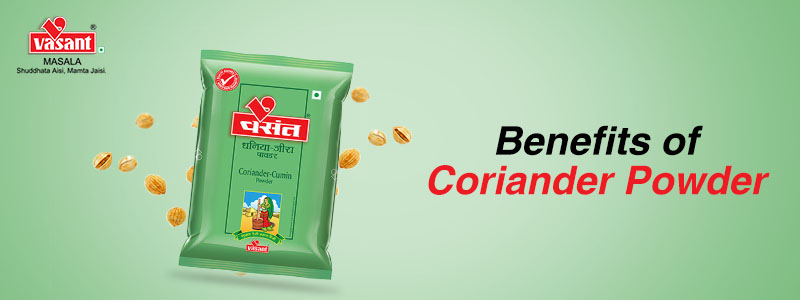
Coriander can be considered both a herb and a spice. It is a member of the parsley (Apiaceae) family. The word coriander can be used to define the whole plant: its leaves, stems, seeds, and all. Coriander seeds are round and tannish brown and have a bit of a spicy, citrusy flavor. Coriander is a native plant around the world, including Europe, Asia, Africa, and America. The coriander spice AKA Dhaniya Powder is the ground form of seeds and is very popular in India. It is one of the customary spices that is used in many savory dishes.
Origin:
Coriander can easily be considered as one of the oldest spices on record as the seeds have been found in ruins dating back to 5000 B.C. References to coriander can be found in Sanskrit writings, Bible, and in Egyptian tombs. Its name comes from the Greek word koris, which means a stink bug. Coriander was one of the first herbs grown by the American colonists of Massachusetts.
Health Benefits:
Coriander is a very popular spice in the kitchen, and apart from that it also has many incredible health benefits.
- Coriander seeds have antiseptic properties, and so they are quite effective in curing different skin ailments like eczema, itchy skin, rashes, and inflammation.
- Some ancient practices believe that regular usage of coriander can help in maintaining a healthy blood sugar level.
- Coriander seeds are popular in preventing hair fall and invigorating the roots for the development of new healthy hair.
- Coriander seeds have various essential vitamins like folic acid, vitamin A and beta-carotene, and most importantly, vitamin C.
- It can help fighting cold & flu as coriander has a large quantity of Vitamin C in it.
- Coriander seeds contain a compound called Coriandrum, which controls the process of lipid digestion, and brings down our cholesterol levels.
- Coriander seeds have anti-oxidant properties and dietary fibre that promotes the healthy working of the liver and facilitate bowel moments.
- Coriander’s anti-inflammatory properties may safeguard in maintaining heart health and brain health.
- It's antibacterial and antimicrobial properties can help you build an immune system to protect yourself against food poisoning and foodborne diseases.
- Drinking coriander water every morning can help you achieve a radiant glow, and give you clear, smooth skin.
How to Use Coriander?
Coriander, popularly known as dhania in India, is widely used across various regional cuisines to flavor curries, stir-fries, snacks, breakfast items, etc. The fresh leaves of coriander are commonly used as garnishing on most dishes, they are added raw to the dish just before serving as heat tends to lessen its flavor rapidly. The seeds are used for pickling and brining, and a ground powder is used in cooking for as a spice in dishes like curry and in baked goods.
Cumin seeds & Fennel seeds are often used as the substitute of coriander powder and also along with it to enhance the flavor of any dish. Just remember to store coriander seeds and ground coriander in airtight containers away from direct sunlight and heat.
While purchasing the coriander seeds or powder, make sure to buy them from a reputed brand that does not compromise on the quality of the product like Vasant Masala. We are one of the best spice manufacturers of Gujarat offering more than 50 different spice variants in both whole and ground form for the past 50 years. You can also buy a mixture of coriander-cumin powder on our online masala store.

